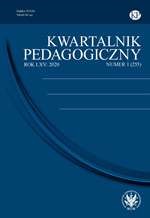Zdrowie reprodukcyjne kobiet – analiza poziomu wiedzy młodych studiujących kobiet w zakresie problematyki prokreacji
Women’s reproductive health – an analysis of the level of knowledge of young female students in the field of procreation
Author(s): Katarzyna Walentynowicz-Moryl, Edyta MianowskaSubject(s): Social Sciences, Education, Sociology, Family and social welfare
Published by: Wydawnictwa Uniwersytetu Warszawskiego
Keywords: fertility; fertility awareness; female students; education
Summary/Abstract: The main purpose of the article is to establish the level of knowledge about fertility among female students of the University of Zielona Góra. The presented analyses used part of the empirical material from the project “The role of fertility assumptions in the formation of procreative intentions” carried out on a representative sample of full-time female students of the University of Zielona Góra. The respondents have the highest level of fertility knowledge related to changes in women’s reproductive abilities with age. However, it should be noted that their awareness in this aspect is rather medium. For the most part, they correctly identify the age at which the woman is most fertile and the age at which her ability to conceive issignificantly reduced. However, the vast majority of respondents are convinced that the process of reducing the ability of women to become pregnant begins later than in reality.As for the other two dimensions of fertility knowledge – the dimension related to estimating the chances of getting pregnant and the dimension related to infertility – the women are characterised by their low or average level. Most of the respondents overestimate the chances of pregnancy of a young woman (up to 25 years old), who had unprotected intercourse atthe time of ovulation and a woman who, aged 25–30, had unprotected intercourse regularlyduring a period of one year. More than half of female students are aware of the scale ofinfertility in Poland, but at the same time most of them overestimate the effectiveness of invitro fertilisation. The results obtained are similar to those obtained by researchers fromother countries. Therefore, it is necessary to postulate including to the educational programthe knowledge about the specificity of the human body, which is characterised by limitedability to conceive a child and changes in the fertility level of women appearing with age.
Journal: Kwartalnik Pedagogiczny
- Issue Year: 255/2020
- Issue No: 1
- Page Range: 160-173
- Page Count: 14
- Language: English
- Content File-PDF

